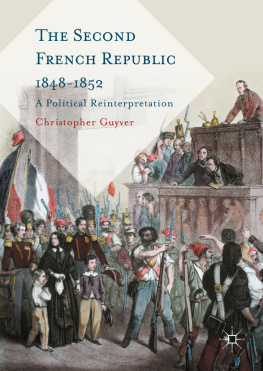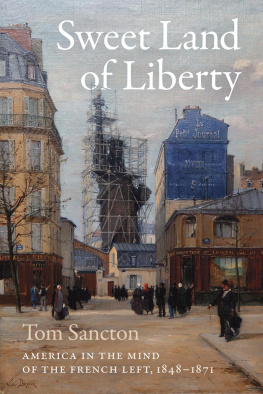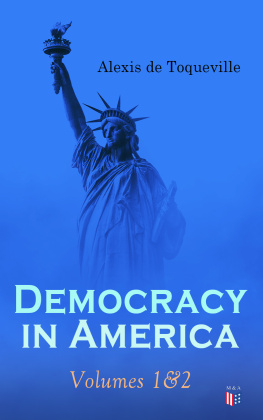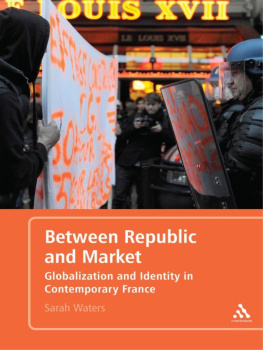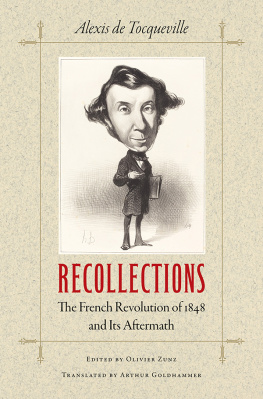1. Introduction
The history of France after 1814 is a catalogue of instability, fear, hope, and failure. This instability is a constant theme in the literature of the period, and contemporaries often yearned for more heroic eras. Many of those who lived through this period hated it. Historians can take the very different view that this was one of the most fascinating periods to study. Many of the themes beloved of historianscontinuity, change, the enacting of revolutionary ritual, violence, and fearleap out from this epoch.
The revolutionary destruction of the ancien rgime after 1789 and the succession of constitutions did not solve the problem of how to rule France. This problem did not go away with the either the Terror, the coup of Thermidor, the coup of Brumaire, the coronation of Napoleon as Emperor, or his abdication in April 1814 when the Bourbons were recalled to France. The compromise of July 1830 pleased the ruling class of notables (a term that came into usage under Napoleon to designate the new ruling class, an amalgam of the pre-revolutionary nobility and the new men who made up the masses of granite of society).
We now know that France has been a Republic ever since 1870, with the important exception of the period 194044. This was not, however, inevitable as there were other traditions that had a strong grip on loyalties within the political class, and as the suffrage extended, among all (male) voters. Royalism was divided between fidelity to the elder branch of the Bourbons (legitimism) or to the cadet branch (Orleanism). Both branches had had their time in the sun: the senior branch ruled from 1814, interrupted by the Hundred Days of 1815 and fell in 1830, to be replaced by the junior branch of the Orlans family, which fell in turn in 1848. Even after these two revolutions, there was still a strong possibility that France could have become a monarchy once more in the early 1850s. The last and, in 1852, triumphant political tendency was Bonapartism, which was itself a product of the Revolution of 1789 and fed as much on bitterness against the monarchies of 1814/1548 as any variant of republicanism. Even after the proclamation of the Republic in September 1870, it took nearly half a decade for the republican form of government to be given definitive constitutional form.
After the bloodshed of the First Republic, the founders of the Second wanted the world to see that the republican form of government was profoundly humanitarian and a break with the corruption of the monarchical form of government. Of all the regimes of the period 181470, the Second Republic (184852) has left the greatest legacy in France: not least of which was the abolition of slavery in the colonies and the abolition of the death penalty for political offenses. The introduction of universal manhood suffrage involved millions of Frenchmen in the political decisions of their nation. The novelty of this system gave the Second Republics elections a greater urgency than they had before in the period of restricted suffrage. Understanding the fear that the word democracy caused to the political elites requires a leap of historical imagination. But although the stakes were higher, decisions made at the top were still just as important: thus five-and-a-half million votes may have opened the doors of the lyse Palace to President Louis-Napoleon Bonaparte in December 1848, but the decision to have a coup dtat three years later in December 1851 was his, and his alone.
For the majority of the Second Republics existence, France was not governed by convinced republicans. If Pierre Rosanvallon has qualified the constitutional monarchy of 181448 as the impossible, the Republic of 1848 was no less impossible. Republicanisms capital was the highest during periods of revolutionary instability, as was seen in 1830, 1848, and 1870, but as a system of government it only scraped through third time lucky when all other possibilities had been exhausted.
This books focus is the fears and plans of the political elite displaced in February 1848 but absorbed back into power in the following months and years, and why suspicion of and indifference toward the Republic as a form of government and fear and hatred of the new ideas of socialism were what divided them the least. We are offered the intriguing, if unedifying, spectacle of men and women often described as liberals being ready to sacrifice all the principles they had tended before 1848 in order to preserve society as they knew it during the longest political crisis of the nineteenth century.
The general trend in historiography over the last century and a half has been first to dismiss the Republic as a futile endeavor and later to embrace it as the harbinger of social democracy. Its futility was most powerfully illustrated by three of the most influential works written on it: two were written during its short existence and the third soon after its extinction: Tocquevilles Souvenirs , Marxs The Class Struggles in France , and The Eighteenth Brumaire of Louis Bonaparte . Marxs true fame was to emerge in the 1860s at the time of the First International and the publication of Capital. Tocqueville, who had served as Minister of Foreign Affairs during the summer of 1849 and had already written the two books of Democracy in America , needed no such introduction to contemporaries, but his Souvenirs were written in the seclusion caused by the early stages of the tuberculosis that was to kill him in 1859.
Having produced the Communist Manifesto with Engels in January 1848, which eagerly predicted the impending revolution of the proletariat, Marx needed to explain why the outcome of the revolutions of 1848 had been so different from his confident forecast. Unlike his conservative contemporaries, for whom the 1848 revolution was a meaningless interlude, Marx had to tread the line of emphasizing both why it was important in the history of the class struggle (a concept he borrowed from the liberal French historians Thierry and Guizot) and why its failure was historically necessary, through building up a powerful counterrevolution that could in turn produce a stronger revolutionary force. The Class Struggles in France, 18481850 , was Marxs first historical work and was published first in the Neue Rheinische Zeitung in 1850, based on his own reporting for that newspaper. Much of his account was based on his own firsthand observations, correspondence with people on the spot, and on a wide-ranging reading of the daily press.
Tocquevilles Souvenirs , written partly while he was convalescing from tuberculosis, have been equally influential on our understanding of the Republic. Tocqueville had a satirists eye for the foibles of his contemporaries (and very often for those of his close friends). Although he came to very different conclusions, Tocqueville had drunk from the same historical springs as Marx: he, too, believed in the role of class struggle in history; where he, the aristocratic liberal and the exiled socialist journalist Marx agreed, it could be powerful, for instance in their analysis of the June Days.
Marie dAgoult, famous to posterity as the mistress of Franz Liszt and mother of Cosima Wagner, writing as Daniel Stern, quickly produced her Histoire de la Rvolution de 1848 , based on eyewitness testimony, written sources from newspapers, and help from leading republicans and socialists. It covered the period of the Republic to the presidential election of 10 December 1848 (and as the third and final volume was published in the very different world of the France of Napoleon III of 1853, it is not surprising that the history ended at that point). The first volume of the three-volume history was published in 1850, when it was clear that the democratic and social Republic she had welcomed in February 1848 was dead, if not formally buried. This was a work of faith in the people, whose naive enthusiasm of fraternity, a proud disinterest, delicate courtesy, natural generosity, and humanity had been betrayed by the old Orleanist political class and a minority of secret society members. Her grand philosophical theme that the Revolution was an ineluctable historical process (she was well read in German philosophy, Hegel above all, something that was rare among her French contemporaries) would have to be put on hold by the election of Louis-Napoleon Bonaparte in December 1848, when the history ended.

